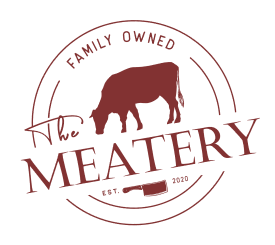In this blog, we'll be taking a deep dive into what makes American Wagyu "American." We'll be going over origin, it's comparison to other types of Wagyu, and much much more!
But first, let's address the big question that everyone's thinking about...
Why is American Wagyu so expensive?
American Wagyu commands premium prices due to several factors that contribute to its exceptional quality and production costs. The primary reason lies in the intensive care and specialized farming practices required to raise these cattle. Farmers must maintain strict feeding protocols, often including specialized grain diets that can last 400-500 days, significantly longer than conventional beef cattle.
The genetic heritage of American Wagyu also plays a crucial role in its pricing. These cattle are descendants of Japanese Wagyu breeds, particularly the famous Black Wagyu (Kuroge Washu), crossed with high-quality American cattle breeds. The breeding programs are carefully managed to maintain genetic integrity, requiring substantial investment in breeding stock and genetic testing.
Production costs are further elevated by the extended raising period. While conventional cattle reach market weight in 12-14 months, American Wagyu typically requires 24-30 months. During this time, ranchers provide premium feed, specialized veterinary care, and maintain specific environmental conditions to ensure optimal marbling development. The slower growth rate and additional resources required significantly impact the final cost.
Additionally, the yield per animal is relatively lower compared to conventional beef cattle, as farmers prioritize quality over quantity. The intricate processing and strict grading systems also contribute to the final price point, ensuring that only the highest quality meat reaches the market under the American Wagyu label.
Is American Wagyu Beef Worth It?
The value proposition of American Wagyu beef depends largely on individual preferences and expectations. From a culinary perspective, the meat offers an exceptional dining experience characterized by intense marbling, superior tenderness, and rich, complex flavors that distinguish it from conventional beef.
The primary benefits that justify the premium price include:
- Exceptional marbling that creates a "melt-in-your-mouth" texture
- Complex flavor profile with buttery, umami notes
- Superior tenderness due to the fine fat distribution
- Higher quality standards in production and processing
- Unique dining experience that's difficult to replicate with regular beef
For special occasions or culinary enthusiasts, American Wagyu can provide an unparalleled experience worth the investment. However, it's important to note that the high cost makes it impractical for everyday consumption for most consumers. The value also depends significantly on the source and grade of the specific cut, as quality can vary between producers.
When considering the purchase, consumers should weigh factors such as the occasion, their culinary expertise (as proper preparation is crucial), and their budget. For those who appreciate fine dining and understand the nuances of high-quality beef, American Wagyu often proves worth the premium price.
What Breed is American Wagyu?
American Wagyu represents a sophisticated crossbreeding program between Japanese Wagyu cattle and traditional American beef breeds. The foundation typically involves Japanese Black Wagyu (Kuroge Washu) genetics combined with high-quality American breeds such as Angus or Holstein.
The primary breeds used in American Wagyu production include:
- Japanese Black Wagyu: The primary Wagyu breed used for crossbreeding, known for superior marbling
- Black Angus: Selected for its excellent meat quality and adaptability to American farming conditions
- Red Angus: Sometimes used for specific breeding programs
- Holstein: Occasionally used in certain crossing programs
The breeding ratios can vary, but most American Wagyu cattle are F1 crosses (50% Wagyu, 50% Angus) or higher-percentage Wagyu crosses. Some programs maintain pure-bred Wagyu lines, though these are less common. The specific genetic composition significantly influences the final meat quality and marbling characteristics.
Comparison Of American Vs. Japanese Wagyu
While both American and Japanese Wagyu are premium beef products, they differ significantly in several key aspects:
Genetic Composition:
- Japanese Wagyu: Pure bloodlines strictly regulated by Japan's government
- American Wagyu: Crossbred with American cattle breeds
Marbling Characteristics:
- Japanese Wagyu: Finer, more abundant marbling patterns
- American Wagyu: Substantial marbling but generally less intense than Japanese
Flavor Profile:
- Japanese Wagyu: More delicate, buttery flavor
- American Wagyu: Robust beef flavor with enhanced richness
The production methods, feeding practices, and regulatory standards also differ significantly between the two varieties, resulting in distinct end products that cater to different market preferences.
Grading Systems
American Wagyu beef employs a unique grading system that differs from both traditional USDA grades and Japanese Wagyu grades. The American Wagyu Association (AWA) has developed specific standards that consider marbling, color, texture, and firmness.
The primary grading levels include:
- Prime Plus: Exceptional marbling, comparable to Japanese BMS 9-12
- Prime: Superior marbling, exceeding USDA Prime
- Choice: High-quality but less intense marbling
- Select: Minimal marbling but still superior to conventional beef
Additionally, some American Wagyu producers use the Japanese Beef Marbling Score (BMS) system, which ranges from 1-12, to provide more detailed marbling assessment. This helps consumers better understand the quality level they're purchasing.
Health And Nutrition Benefits
American Wagyu beef offers several distinct health advantages compared to conventional beef, primarily due to its unique fat composition and quality:
Key Nutritional Benefits:
- Higher concentration of monounsaturated fats
- Better ratio of omega-3 to omega-6 fatty acids
- Rich in essential minerals including iron and zinc
- High-quality protein content
- Contains conjugated linoleic acid (CLA)
The marbling in American Wagyu consists largely of intramuscular fat, which contains higher levels of oleic acid, a heart-healthy monounsaturated fatty acid. Research suggests that the fat composition in Wagyu beef may have potential health benefits, including improved cholesterol ratios and better overall cardiovascular health when consumed as part of a balanced diet.
However, it's important to note that Wagyu beef is still a high-calorie food and should be consumed in moderation as part of a varied diet. The superior fat quality doesn't negate the need for portion control and balanced nutrition.









